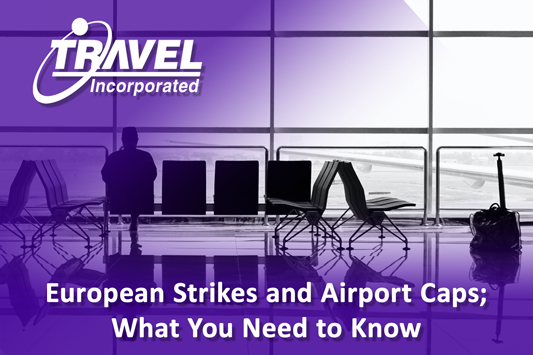European Strikes and Airport Caps What
You Need to Know
(August 2022)
Over the past few months, European airlines and their hub airports have been struggling to manage demand, facing similar challenges as the U.S. with staffing shortages and canceled routes. As a result, key international airports have decided to put capacity limits on their incoming and outgoing flights, while airline workers are adding to the challenges striking requesting pay increases and improved working conditions..
Highest Impacted Airports
London Heathrow Airport and Amsterdam’s Schiphol have been the most impacted and have taken it upon themselves to impose caps as well as requesting their key airline partners to reduce sales of summer tickets.
Heathrow’s CEO, John Holland-Kaye has imposed daily capacity caps of 100,000 passengers through September 11, to reduce the impact on customers. He went on to state the decision is “due to a combination of reduced arrivals punctuality as a result of delays at other airports and in European airspace and increased passenger numbers starting to exceed the combined capacity of airlines, airline ground handlers and the airport.”
Amsterdam’s Schiphol in June announced that the maximum number of departing passengers it could handle for July and August would vary per day and go up to 67,500 on the busiest days in July and up to 72,500 in August. Schiphol CEO Dick Benschop commented that “setting a limit now means that the large majority of travelers will be able to travel from Schiphol in a safe and responsible way.”
On July 20, Frankfurt International airport advised it will institute capacity limitations to 88 flights per hour, reducing the number of take offs and landings.
Restricted Sales
The flight capacity has forced airlines to reevaluate their own challenges with both Lufthansa and KLM each agreeing to restrict sales of lower-priced tickets to ease the cancellations and delays plaguing not just those airlines, but the industry overall. KLM went on to state the restriction cannot be viewed as a ‘structural solution’ but a necessary approach to align with the needs of the travelers, airports and the carriers who service them.
Impacts by Carrier
Following a letter of apology from Lufthansa’s Board of Directors for its unreliable service at the time due to limits of the resources that are currently available, the carrier canceled thousands of flights this summer impacting Frankfurt and Munich airports offering the “situation is unlikely to improve in the short term.”
British Airways canceled over 10,000 short-haul flights between August and October, which contributed to the roughly 30,000 canceled flights announced this year according to the BBC.
Threats of transportation strikes across the United Kingdom and Europe are a reality, with Scandinavian Airlines’ pilots walking off the job in July, causing the carrier to file for bankruptcy protection.
To assist the carriers in managing their airport slots, the U.K. government allowed a one-off ‘amnesty’ on airport slot rules, enabling airlines to ‘hand back’ their slots ahead of the summer peak to help them plan a deliverable schedule, allowing other airlines to use the current season before being returned to the airlines that normally
owned them.
Strikes and Labor Unrest
Organized strikes are becoming more prevalent across Europe, with Norwegian Airlines, Scandinavian Airlines agreeing to pay increases for pilots in order to avoid additional cancellations. British Airways and KLM have suffered through disruptions, and in the end, agreed to wage deals for ground staffers. This past week Ryanair’s Spanish cabin crew threatened to strike 4 days a week through January to press higher wages and improved working conditions, while Lufthansa pilots agreed by a vote of 97.6% in favor of ‘industrial action’ this past week which may continue to create further disruption across the German carrier’s routes.
The Travel Manager Perspective
In a recent Business Travel News article, one travel manager spoke of the challenges they have been experiencing including long lines for security and immigration which led to missed flights without compensation, or housing consideration even though it was included in the carrier’s contract of carriage.
Similar to corporate travelers in the U.S., European travelers are being urged to follow these recommendations:
Always choose to carry-on your luggage. Lost bags have escalated over the past few months. Recommendation is to carry on, even if it is more expensive to do so. This will assist with flexibility to change travel plans.
You know where you’re going, book smart to get there. One of the key issues with traveling today is the potential for connecting flights to wreak havoc with your travel plans. The best course of action is to make sure you
choose the most direct flight possible to your final destination to avoid any delays.
Know Your rights! In 2004, the European Union passed the EU261 regulation which protects passengers against severe flight disruption. The legislation confirms that long delays, cancellations, missed connections and flight re-bookings cause great inconvenience to the passenger, and as such affected passengers should be compensated. The primary parameters include you must have a valid ticket that was publicly available, checked in on time, start or end your trip at an EU airport on a carrier headquarters in the E.U.
To learn more and to calculate potential compensation amounts, click here.
You Need to Know




Leave a Reply
Want to join the discussion?Feel free to contribute!